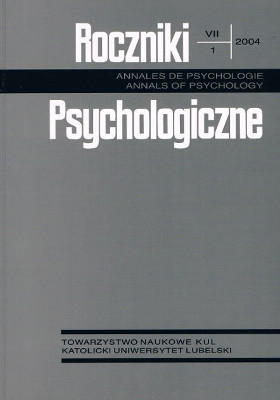Reasoning from promises presented in different orders. Empirical verification of the mental model theory
Abstract
The aim of conducting research was to investigate how naive reasoners draw inferences from three premises presented one at a time on a computer screen. According to the mental model theory of reasoning those orders of the premises that call for construction of multiple models should be harder that orders calling for a single model that is only updated with the information from subsequent premises. This prediction was corroborated by means of both accuracy and reaction times in the experiment in which participants were free to draw their own conclusions. It also turned out that drawing conclusions from disjunction inferences with a positive categorical was more difficult that drawing conclusions from inferences with a positive categorical. Also inferences containing two disjunctions proved to be harder than disjunction and conditional inferences.
References
Baron, J. (1994). Nonconsequentialist decisions. Behavioral and Brain Sciences, 17, 1-42.
Bauer, M. I., Johnson-Laird, P. N. (1993). How diagrams can improve reasoning. Psychological Science, 4, 372-378.
Borkowski, L. (1991). Wprowadzenie do logiki i teorii mnogości. Lublin: TN KUL.
Braine, M. D. S., O'Brien, D. P. (red.) (1998). Mental logic. Mahwah, NJ: Erlbaum.
Dekeyser, M., Schroyens, W., Schaeken, W., Spittaels, O., d'Ydewalle, G. (2000) Preferred premise order in propositional reasoning: Semantic informativeness and co-reference. W: W. Schaeken, G. de Vooght, A. Vandierendonck, G. d'Ydewalle (red.), Deductive reasoning and strategies, s. 73-95. Hillsdale, NJ: Erlbaum
Evans, J. S, Newstead, S. E., Byrne, R. M. (1993). Human reasoning. The psychology of deduction. Hove: Erlbaum.
Evans, J. S. (2002). Logic and human reasoning. An assessment of the deduction paradigm. Psychological Bulletin, 128, 978-996.
García-Madruga, J. A., Moreno, S., Carriedo, N., Gutiérrez, F., Johnson-Laird, P. N. (2001). Are conjunctive inferences easier than disjunctive inferences? A comparison of rules and models. Quarterly Journal of Experimental Psychology, 54A, 613-632.
Girotto, V., Mazzocco, A., Tasso, A. (1997). The effect of premise order in conditional reasoning: A test of the mental model theory. Cognition, 63, 1-28.
Johnson-Laird, P. N., Byrne, R. M. J. (1991). Deduction. Hillsdale, NJ: Erlbaum.
Johnson-Laird, P. N., Savary, F. (1999). Illusory inferences: A novel class of erroneous deductions. Cognition, 71, 191-229.
Mackiewicz, R. (2000). Rozumowanie warunkowe w interpretacji modeli umysłowych. Lublin: TN KUL.
Mała Encyklopedia Logiki (1988). Wrocław: Ossolineum.
Noveck, I., Chierchia, G., Chevaux, F., Guelminger, R., Sylvestre, E. (2002). Linguistic-pragmatic factors in interpreting disjunctions. Thinking and reasoning, 8, 297-326.
O'Brien, D. P., Braine, M. D. S., Yang, Y. (1994). Propositional reasoning by mental models? Simple to refute in principle and in practice. Psychological Review, 101, 711-724.
Richardson, J., Ormerod, T. C. (1997). Rephrasing between disjunctions and conditionals: Mental models and the effects of thematic content. Quarterly Journal of Experimental Psychology, 50 (A), 358-385.
Rips, L. J. (1994). The psychology of proof. Cambridge, MA: MIT Press.
Roberge, J. J. (1976). Reasoning with exclusive disjunctive arguments. Quarterly Journal of Experimental Psychology, 28, 419-427.
Shafir, E. (1994). Uncertainty and difficulty of thinking through disjunctions. Cognition, 50, 403-430.
Sperber, D., Wilson, D. (1986). Relevance: Communication and Cognition. Oxford: Basil Blackwell.
Stanovich, K. E., West, R. F. (2000). Individual differences in reasoning: Implications fo the rationality debate. Behavioral and Brian Sciences, 23, 645-726.
Toplak, M. E., Stanovich, K. E. (2002). The domain specificity and generality of disjunctive reasoning. Searching for a generalizable critical thinking skill. Journal of Educational Psychology, 94, 197-209.
Van der Henst, J. B. (1999). The mental model theory of spatial reasoning re-examined: The role of relevance in premise order. British Journal of Psychology, 90, 73-84.
Copyright (c) 2004 Roczniki Psychologiczne

This work is licensed under a Creative Commons Attribution-NonCommercial-NoDerivatives 4.0 International License.


